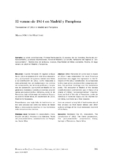El verano de 1814 en Madrid y Pamplona
Fecha
2011Autor
Versión
Acceso abierto / Sarbide irekia
Tipo
Artículo / Artikulua
Impacto
|
|
nodoi-noplumx
|
Resumen
Cuando Fernando VII regresó a España
en 1814 se estableció el más feroz absolutismo
y la represión de quienes habían sido fieles
a la Constitución de 1812. Como respuesta a
esta actividad real, se multiplicaron los centros
de conspiración, las tertulias políticas y los planes
de subversión. La reunión en Madrid de los
generales liberales y constitucionalistas propició
varios pronunciamientos mili ...
[++]
Cuando Fernando VII regresó a España
en 1814 se estableció el más feroz absolutismo
y la represión de quienes habían sido fieles
a la Constitución de 1812. Como respuesta a
esta actividad real, se multiplicaron los centros
de conspiración, las tertulias políticas y los planes
de subversión. La reunión en Madrid de los
generales liberales y constitucionalistas propició
varios pronunciamientos militares, como el de
Pamplona, bajo el liderazgo del mariscal Espoz y
su sobrino Xavier Mina, en septiembre de 1814,
finalmente fracasado.
Presentamos una larga lista de testimonios sobre
este proceso así como los textos de Xavier
Mina y otros autores escritos en los momentos
más cercanos a los hechos. [--]
When Fernando VII come back to Spain
at 1814 it was established the most ferocious
absolutism and began the repression to the followers
of the 1812 Constitution. As a response
to this royal action, increased the conspiracy centers,
the political meetings and the subversion
plans. The encounter in Madrid of the liberals
constitutionalist commanders was in favour of a
chaine of military “pronunciam ...
[++]
When Fernando VII come back to Spain
at 1814 it was established the most ferocious
absolutism and began the repression to the followers
of the 1812 Constitution. As a response
to this royal action, increased the conspiracy centers,
the political meetings and the subversion
plans. The encounter in Madrid of the liberals
constitutionalist commanders was in favour of a
chaine of military “pronunciamientos” (insurrections)
as that of the city of Pamplona, under de
lidership of marechal Espoz and his nephew Xavier
Mina, but it end as a final disaster.
Here we present a long list of testimonies about
this process so that Xavier Mina’s and other
authors writings at the most immediate moment
of the facts. [--]
Materias
Fernando VII,
Absolutismo,
Constitución de 1812,
Proceso a los liberales,
Teoría del pronunciamiento,
Levantamiento de Pamplona,
Xavier Mina,
Ferdinand the VII,
Absolutism,
The Constitution of 1812,
The liberal prosecution,
The “pronunciamiento” (insurrection) theory,
Uprisign of Pamplona,
Xavier Mina
Editor
Universidad Pública de Navarra / Nafarroako Unibertsitate Publikoa
Publicado en
HUARTE DE SAN JUAN. Geografía e Historia N. 18 / Geografìa eta Historia 18.Z. Pamplona: Universidad Pública de Navarra / Nafarroako Unibertsitate Publikoa, 2011. Págs. 385-413



